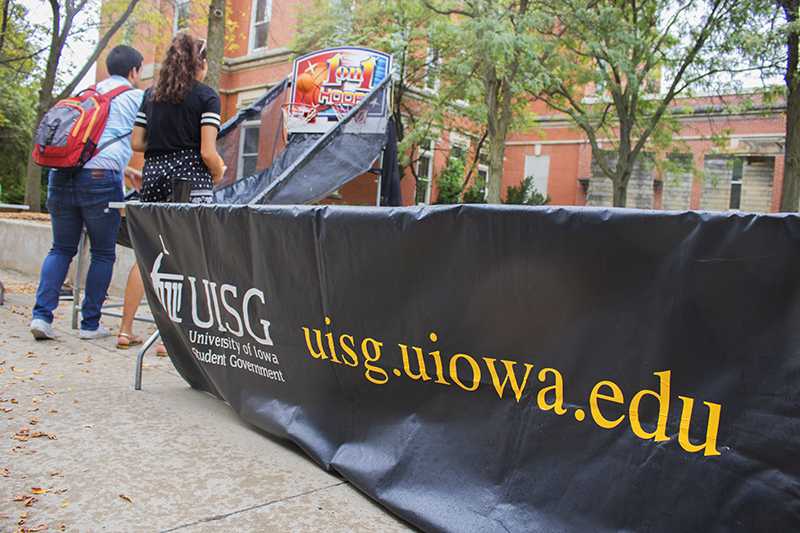Weigel: What is behind the ideological bias in UISG?
A recent internal UISG survey revealed that most UISG members consider themselves liberal while few consider themselves conservative. I argue that this ideological bias raises serious concerns about just how representative UISG is of the undergraduate student body.
Students shoot hoops on the T. Anne Cleary Walkway on Tuesday, September 26, 2017. UISG hosted tables where students could register to vote.
September 4, 2018
In June, the undergraduate UI Student Government released an internal report that detailed the demographic makeup of UISG. Members answered a variety of questions such as what race, socio-economic status, gender, and academic status they identified with. Chiefly, UISG opted to commission this survey as a way to gauge how diverse and representative the student government is.
As a good sign for representation, the results of the report indicate that UISG is fairly racially representative of the student body. UISG’s makeup roughly mirrors the racial makeup of the student body. However, the report alarmingly reveals that UISG has an astonishing liberal bent. Among the members surveyed, 49 percent identified as liberal while only 4 percent identified as conservative (the other 47 percent said they fall somewhere in-between).
At face value, the strong liberal bias among UISG members could be dismissed as happenchance. Yet upon further scrutiny, I believe the bias is concerning and should be monitored.
Although there are no statistics currently available to parse the ideological leanings of UI students, when you compare the ideological makeup of UISG with the partisan affiliations of college students at large, there is a stark difference. According to a nationally representative 2016 Survey of America’s College Students published by the Panetta Institute for Public Policy, a 49-47-4 split among liberals, moderates, and conservatives is far from the norm. Panetta’s report suggests that although the ideological breakdown among college students is biased toward liberals, the ratio is far from the 49:4 ratio present among UISG members.
Specifically, Panetta’s report posits that over the last 15 years, the partisan affiliation of college students has ranged from 43-54 percent Democrats and 25-33 percent Republicans. And while partisan affiliation is not a perfect proxy for ideology, research has consistently found that ideology and partisanship are inextricably correlated among college students. In other words, it’s safe to say that a 49-4 percent split among liberals and conservatives does not closely mirror the ideological leanings of college students at the UI.
As a sign of good faith, upon releasing its internal report, UISG explicitly noted that it is trying to root out biases in the membership to attain better representation. For instance, UISG is considering having constituency seats for underrepresented populations such as student-athletes, transfer students, and non-liberal-arts students. UISG has also taken steps to try to make itself more transparent by acknowledging the holes in its representation and offering numerous outreach events to, hopefully, reach underrepresented groups.
It’s definitely concerning that conservative voices are missing from UISG
Notwithstanding UISG’s efforts, I think it is worth asking: Why are conservatives underrepresented, and is this a systemic problem or a momentary plight? Do conservative-leaning college students just not want to be a part of UISG, or are conservatives discouraged/discriminated against? Or is something else causing the sparse conservative presence in UISG?
Perhaps the strong liberal lean of UISG is an anomaly that will work itself out. Then again, maybe conservative voices have been missing from UISG for some time. Sadly, we just don’t know, because the internal UISG survey was the first of its kind, so there is no record of the ideological leanings of past student governments.
UISG has pledged to rerun its internal survey every semester so that it can continually monitor how representative it is. This is a good move that I applaud, because future surveys will be able to tell us if the stiff liberal bias in UISG is a persistent occurrence or simply an anomaly. However, for the time being I think it’s concerning that conservative voices are missing from UISG.














